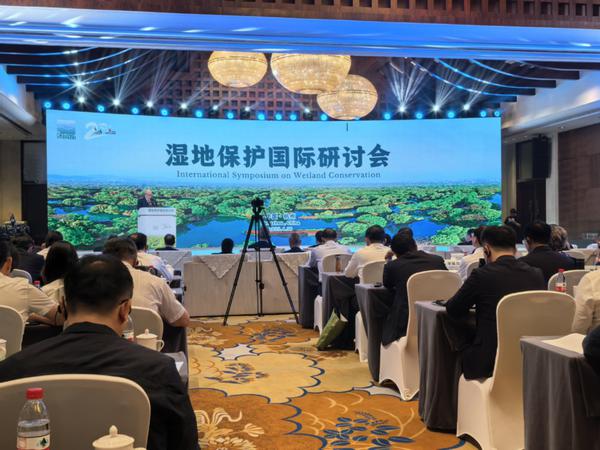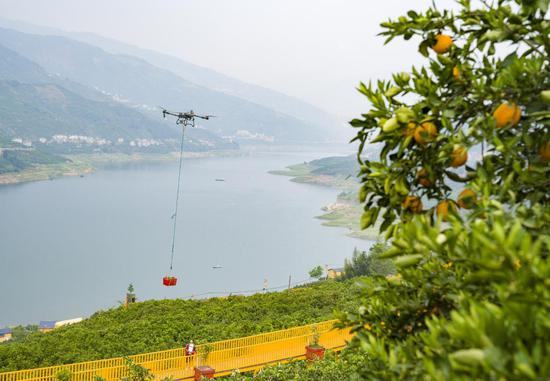
The International Symposium on Wetland Conservation is held in Hangzhou on Wednesday. (Photo by Yan Dongjie/chinadaily.com.cn)
China has established 903 national wetland parks over the past two decades, safeguarding 2.4 million hectares of wetlands and providing vital habitats for endangered species such as the black stork and Chinese merganser, officials said at an international wetland conservation symposium held in Hangzhou, Zhejiang province, on Wednesday.
The event, commemorating the 20th anniversary of China's national wetland park system, highlighted the country's efforts to balance ecological preservation with sustainable development, according to the National Forestry and Grassland Administration.
Over 90 percent of these parks are free to the public, driving regional economic growth by more than 50 billion yuan ($6.9 billion) while promoting eco-tourism, cultural activities, and environmental education.
"Wetland parks exemplify China's commitment to harmonizing ecological protection and human well-being," said Wang Zhenbo, a researcher at the Institute of Geographic Sciences and Natural Resources Research of Chinese Academy of Sciences.
"By restoring degraded wetlands and integrating them into urban planning, we've not only revived biodiversity but also created green havens that benefit millions," he said.
Since 2012, China has implemented over 3,700 wetland restoration projects, adding or rehabilitating more than 1 million hectares of wetlands under its National Wetland Protection Plan (2022–30).
The country now boasts 82 internationally recognized wetlands and 58 nationally significant sites, with plans to integrate 11 million hectares into its national park system. Key initiatives, such as mangrove conservation and invasive species control, have further solidified China's role in global wetland governance.
As China's first national wetland park, the Xixi wetland has become a blueprint for sustainable urban development. By adhering to "ecological priority" principles, Hangzhou has transformed the 10.38-square-kilometer park into a biodiversity hotspot, with vascular plants increasing by 750 species, insects by 441, and birds by 155 since 2005.
"Xixi's 'gold-inlaid-jade' model — prioritizing wetland conservation while fostering surrounding economic growth — proves that ecology and prosperity can coexist," Wang said.
The park's 21-kilometer greenway and free-entry policies for local residents have drawn over 55 million visitors since 2005, generating 2.4 billion yuan in revenue.
Guangzhou's Haizhu Wetland, once a polluted orchard, now thrives as a biodiversity hub, documenting 835 plant species and 194 bird species, including two newly discovered insects. Its "Haizhu model" of nature education — a collaboration between governments, schools, and NGOs— has hosted 1.6 million participants through courses on traditional culture and ecological conservation.
"Our volunteer programs train citizens to become nature ambassadors, fostering a deeper connection between urban life and the environment," said Feng Baoying, deputy principal of Haizhu wetland nature school, awarded for her innovative environmental advocacy.
In Yunnan, Kunming's Laoyuhe Wetland Park showcases the ecological power of 32,000 flood-resistant Zhongshan fir trees, which filter pollutants and create a unique "water forest" landscape. The park attracts 2 million annual visitors while providing 200 jobs for local communities, exemplifying China's "park-supported-park" sustainability strategy.
"China's leadership in wetland conservation, demonstrated through hosting COP14 of the Ramsar Convention, has set a global benchmark," said Jay Aldous, deputy secretary-general of the Ramsar Convention.
Moving forward, the National Forestry and Grassland Administration plans to strengthen wetland protection networks, focusing on key areas such as the Yellow River Delta and Songnen Crane Habitats.
"Our goal is to ensure wetlands remain a legacy for future generations," Wang said. "Every restored hectare is a step toward global ecological resilience."
Hosted by Xixi Wetland with support from the Ramsar Secretariat and United Nations Food and Agriculture Organization, the symposium convened over 200 experts to share strategies for urban wetland management, underscoring China's vision of ecological civilization.


















































 京公網安備 11010202009201號
京公網安備 11010202009201號